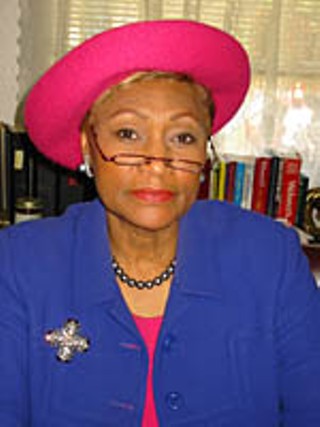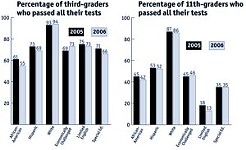TAE Charter Faces Crisis of Dollars and Confidence
Teachers at the Texas Academy of Excellence charter school walk for nonpayment, and the school stumbles on
By Rachel Proctor May, Fri., Feb. 20, 2004

When teachers at the Texas Academy of Excellence were told their January checks would be late, teacher Jody Gay wasn't exactly surprised. The East Austin charter school has suffered financial problems since its founding in 1996, and it had become common knowledge that paychecks not immediately cashed might bounce. But a week later, Superintendent Dolores Hillyer told teachers the school's accounts had been frozen, and she didn't know when they would be paid. That's when Gay and the TAE's nine other early-childhood teachers decided to stay home. Their walkout, which began Feb. 9, drew attention to TAE's ongoing woes, which teachers say affect not just their pay, but students' working environment at the school's campus on FM 969, as well.
On Monday, state Education Commissioner Shirley Neeley informed Hillyer by letter that she is appointing a management team to take control of the school, due to "unacceptable performance" in finance, governance, and administrative operations.
When classes began, "There was no cafeteria, no library, no safe outdoor space to play," Gay said. She added that the TAE addressed some problems, such as solving overcrowding by moving the early-childhood program to a wing of the Capital City Creative School, a preschool that Hillyer has run for decades. But Brenda Weston, who teaches kindergarten at the school's primary location, says other problems persist.
"There's no hot water," said Weston. "The drainage backs up, and it's very smelly. It's often not heated. Sometimes the kids have to wear coats, and teachers take in our own personal heaters."
Finally, the teachers also discovered that retirement money deducted from their checks each month – in Gay's case, $186 – had not been delivered to the Teacher's Retirement Fund; neither had deducted child support money gone to the attorney general's office. "I asked Dr. Hillyer where that money went, and she said it went to electricity, to cleaning, to lots of things," said Weston. "But that's our money that we've earned. And there are employees that could have the constables come pick them up because of the child support."
School representatives and TAE board members did not return repeated phone calls (except for board President Debra Smith-Stevens, who declined comment). But it is clear that the school is struggling, both financially and academically. Test scores lag below state averages and, with a few exceptions, also below those of conventional schools with similar demographics. (The TAE is about 95% African-American, and most students get free or reduced-price lunches.) However, the TAE's problems point not simply to a failure of management, but also to larger issues in the way charters are funded and regulated.
The freeze on the bank accounts, for example, came from the school's previous landlord trying to collect back rent on a building the TAE inhabited until this year. This would never happen to standard public schools, whose facilities are funded directly by the school district. But charter schools do not get money for facilities, and they usually rent. For small charters that aren't run by a corporation, the need to economize can get them into serious financial difficulties. That is what happened to the TAE, which this year relocated from the run-down, flood-prone facility it had rented since 1999, but which has yet to sort out its legal issues with the old landlord. (In the past, the TAE has said the school withheld rent to repair chronic problems the landlord wasn't fixing.)
Third-party audits also show a pattern of sloppy accounting, a problem that Texas Education Agency spokeswoman Debbie Ratcliffe says plagues many charters. Incomplete books, in turn, exacerbated other TAE problems, such as the administration's overestimating enrollment the first year and spending two years repaying a $280,000 overpayment of state per-pupil funds, and the IRS placing a levy on the school's 2001 funding to collect $137,709 in delinquent taxes and penalties.
Ratcliffe says accounting problems are particularly common in the earliest charters that opened. "The oldest charter schools tended to have leaders who were not familiar with accounting regulations," she said, adding that roughly 30 charters have closed or been revoked since 1995, most due to financial reasons. "A lot of these charters were started on a shoestring and just never had much of a rainy day fund."
Ratcliffe said the TEA now helps new charters learn proper accounting and record-keeping. However, the TEA currently has no plans to get involved with the TAE beyond its current "informal" role as advisor. "There are no financial issues that would merit action at this time," she said, adding, "The underlying philosophy of charter schools in state law is that they're supposed to be free of many state regulations. So it's a real balancing act between leaving them alone and stepping in as a state regulator."
Since school officials aren't talking (on Monday, the school phone was disconnected), it's not clear what will happen to the students enrolled in those early-childhood classes, although staff members say that other teachers were filling in. The teachers who left aren't sure what they'll do next, beyond looking for other work. They have met with state Rep. Dawnna Dukes, who advised them on possibilities for collecting unemployment, and possible penalties for the missing pay deductions. But both Weston and Gay said they wish that somebody were paying more attention to charters. "Academically, the charters are watched," said Gay, "but there are so many other things that are important to children's education, such as the environment and morale of employees."
Got something to say on the subject? Send a letter to the editor.










